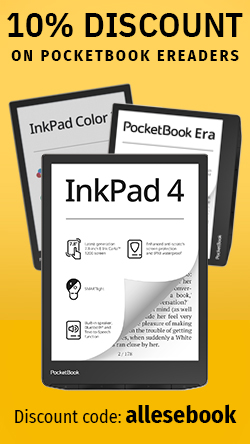Germany eBook Reader Ownership Climbs to 5%, Reflecting Growing Market Potential
The distribution of dedicated eBook readers with eInk screens is particularly high in the USA, which is sometimes cited as the reason why sales have been declining there since 2011 and why the end of eBook readers is repeatedly predicted. In reality, the lower sales volume can also be attributed to the fact that there are few reasons to retire a well-functioning eBook reader and get a new one. Unlike the tablet and smartphone market, the technological advancements in eReaders have remained relatively minimal for a long time.
However, it’s not just the US sales figures that are interesting, but also those in Germany. In contrast to the US market, the German eBook (and eReader) market is growing stronger than ever. As colleague Ansgar from E-Book-News reports, citing the Allensbach Market and Advertising Media Analysis 2013 (AWA 2013), 5.2 percent of Germans over the age of 14 already own an eBook reader. This corresponds to approximately 3.66 million people. An additional 2.49 million, or 3.5 percent, plan to purchase a reading device in the next one to two years.
Six percent of the respondents (4.22 million) say they have bought at least one eBook in the past 12 months. With 12.3 million eBooks sold in 2012, this would mean that an average of around 3 eBooks were sold per person.
It’s also noteworthy that significant growth occurred in the second half of the year. This means that for the first half of 2012, only about a third of the eBooks were sold. The majority (almost two-thirds) of the eBooks sold in 2012 went over the virtual counter in the second half of the year.
Still Prefer Paper
The good old book doesn’t need to worry just yet, as the majority (66.9 percent) still prefer to read on paper. Only 5.9 percent of those surveyed prefer reading on a screen, while a notable 21.7 percent make no distinction between paper and screen. The over 20 percent share is significantly larger than that of eBook reader owners, which means that regular LCD screens are also included here. This somewhat confirms the trend towards tablets, though due to the lack of differentiation in the AWA report, a more precise analysis is unfortunately not possible.
The figures also indicate a further growth potential of almost 70 percent for eBook readers. This forecast aligns approximately with the data from Bitkom, which predicts a 78 percent growth for eBook readers in 2013.
If all the respondents follow through on their purchasing intentions, then by 2013 at least about one in eleven Germans over the age of 14 would have an eBook reader. For comparison: In the USA, one in four people now owns a dedicated reading device. However, this does not take into account eBook readers given as gifts, which likely play a significant role during the holiday season. The proportion of eBook readers could thus grow even more significantly.
Image source: Andreas Neufahrt, flickr
